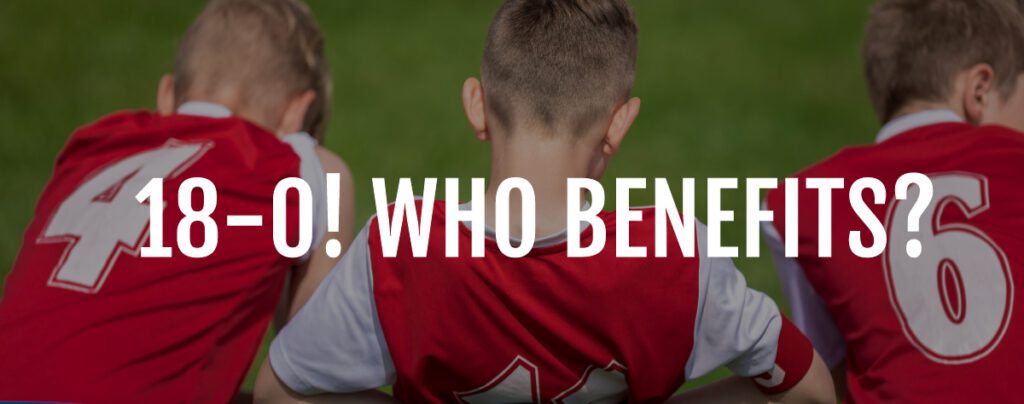
18-0! Really!? Who Benefits from That Score?
We recently attended a junior football match in which the home team won 18-0. As a parent and as a coach we must question why we are seeing these scores, who benefits, and how can these scorelines could be avoided. Here’s our thoughts…
Despite the introduction of the Powerplay rule, still we are seeing shorelines such as this. We need to consider the consequences of this.
As a coach or player, it’s natural to feel elated after a big win in football. But what happens when the score is 18-0? Who really benefits from such a lopsided victory? While some may argue that a win is a win, there are several reasons why a scoreline like 18-0 can have negative consequences for both teams involved.
Firstly, winning by such a large margin can be demoralizing for the losing team. Losing by one or two goals is one thing, but when the margin is so wide, it can be difficult to keep morale high and maintain a positive attitude. Players may feel discouraged and unmotivated, and the coach may struggle to keep them engaged and focused.
Secondly, winning by such a large margin can lead to complacency in the winning team. When a team is dominating the opposition so thoroughly, they may become less focused and less disciplined, which can lead to sloppy play and mistakes. This can be harmful in the long run, as the team may become overconfident and fail to perform as well against stronger opponents.
Thirdly, winning by such a large margin can promote a negative attitude towards the sport. Spectators and parents may feel uneasy watching a team run up the score against a weaker opponent, and this can reflect poorly on the team and the sport as a whole. It can also discourage participation and make it difficult for the losing team to continue playing.
How can these shorelines be avoided?
Where possible it is important to create competitive balance in youth football to ensure an enjoyable, equal and beneficial learning experience for all involved. Here are 5 tips to prevent mismatched fixtures, courtesy of FA Regional coach development manager Jack Walton via The Boot Room….
1. Prevent before cure
You may already have a good idea from looking at the league table and previous results to know whether there may be a mismatch before the game kicks off. Maybe try a quick chat with the other coach before the game to discuss potential strategies to help achieve a more balanced match. You might even contact the coach before the day so that it doesn’t come out of the blue on match day.
2. Play imbalanced numbers
One of the players I currently coach told me that their playground match was always Year 6 v Year 5. “That’s a bit unfair isn’t it” I asked. “No, because there’s ten of us and twenty of them” came the response. How naive of me.
3. Mix the teams up
I recall a big mismatch in a girls U14 game I was involved with in a previous role. At half-time it was clear that nobody was getting a beneficial experience out of the game so I agreed with the other coach that we would get the bibs out and mix up the teams. First-half: 6-0. Second-half: 3-3.
The ‘more able’ players also benefited from having to take more care over their decisions and actions. For example: much greater consideration of pass to one of their new teammates.
4. Quarters rather than halves
Agree to play quarters instead of halves. This gives more opportunities for the coaches to speak with players and agree on strategies to keep the game competitive.
5. Player-centred
Prioritise the players’ needs over your own ego. Most of the problems in youth football are either caused or fuelled by adults. So often it’s up to us to do what’s right and not just what’s easy.
Follow Jack on Twitter @Jackwalton1
Summary
It’s important to remember that football is a team sport and that the focus should always be on fair play and sportsmanship. Winning is important, but not at the expense of the opposing team’s morale and dignity. Coaches should encourage their players to play with integrity and respect, regardless of the scoreline.
In conclusion, a scoreline of 20-0 may seem like a great victory on paper, but it can have negative consequences for both teams involved. Winning by such a large margin can be demoralizing for the losing team, lead to complacency in the winning team, and promote a negative attitude towards the sport. Coaches should aim to win with dignity and respect, and focus on the development of their players rather than simply chasing a big scoreline.








